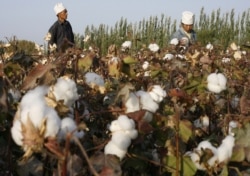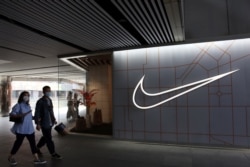Global fashion retailer H&M, hit with a boycott in China after expressing concern over alleged use of Uyghur forced labor in cotton production, is vowing to regain customers in one of the world’s strongest markets.
“China is a very important market to us and our long-term commitment to the country remains strong,” H&M said. “We are now building forward-looking strategies and actively working on next steps with regards to material sourcing.
“We are dedicated to regaining the trust and confidence of our customers, colleagues, and business partners in China,” a company statement issued Wednesday said. China is H&M’s fourth-largest market behind Germany, the U.S. and Britain, and accounted for about 6% of 2020 revenue.
Analysts told VOA Mandarin that Beijing’s propaganda apparatus manufactured the current backlash and predicted the outcry will die down quickly.
Slow to boil
H&M released a statement in September 2020 saying they were concerned about allegations of forced labor in cotton production in Xinjiang.
“We do not work with any garment manufacturing factories located in XUAR, and we do not source products from this region,” the statement said. XUAR refers to China’s Xinjiang Uyghur Autonomous Region, home to Uyghurs and other Muslim minority populations.
The Swedish retailer was not acting alone. A few months earlier, in July, more than 175 organizations launched a campaign to persuade international brands to cut ties with suppliers allegedly tied to using forced Uyghur labor. One in five garments sold worldwide “are tainted by forced labor” because 84% of cotton production from China comes from Xinjiang, the Uyghur region, according to the coalition’s website. “Virtually the entire apparel industry” is tainted, the group said.
China paid little attention at the time although the allegations of forced labor have focused businesses on finding alternative suppliers.
Then, following the announcement of Western sanctions on Chinese officials related to oppression in Xinjiang, the Communist Youth league, a Chinese Communist Party group, stepped up.
The group posted on its official Weibo account on March 24 that H&M “is spreading rumors to boycott Xinjiang cotton, while making a big profit in China,” referring to the 2020 statement issued by H&M, one of the world’s top fashion retailers. “Wishful thinking!” the post said.
Chinese e-commerce giants Alibaba and JD removed H&M from their online platforms, a big hit given that more than a fifth of China’s shopping is done online, according to the Associated Press.
H&M stores in China disappeared from online maps, according to Barrons.
The cotton backlash grew to include Nike, Adidas, Burberry, Uniqlo and Lacoste, all of which need access to one of the world’s biggest and fastest-growing markets.
Dozens of Chinese celebrities terminated endorsement contracts with H&M and other Western brands.
“For enterprises that touch the bottom line of our country, the response is very clear: don’t buy!” China Central Television said on its social media account, according to the Hollywood Reporter. It said the ‘H’ and ‘M’ in the Swedish name stood for Chinese words meaning lie and falsehood.
Choreographed outrage
Zuo La, a Taiwan-based citizen journalist originally from China’s Hunan province, told VOA Mandarin that the government of President Xi Jinping is behind the boycott.
“Xi’s government has been fueling nationalist sentiment in China and suppressing rational voices among Chinese citizens. I think that’s true to this wave of boycott; it was led by the government and didn’t come directly from average citizens,” he said.
Wang Debang, a human rights activist from China’s southern city of Guilin, agreed.
“The boycott and the nationalism right now are controlled by the authorities. They have been deliberately exaggerated and promoted throughout the internet,” Wang told VOA.
RBC Capital Markets analyst Richard Chamberlain in a note quoted by Reuters said, “We have seen brands like Nike and H&M weather similar controversies in the past and maintain relatively strong sales, however short term we think H&M may see a negative impact on its sales in the large and growing Chinese market.”
Wang also mentioned similar past boycotts — a boycott of Japanese products in 2012 and 2018 over the disputed Senkaku islands — ended soon after the initial uproar. The disputed territory is referred to as the Diaoyu islands in China.
“I don’t think patriotism is behind all these boycotts. It was state control in the name of patriotism,” Wang told VOA.
Hangzhou-based veteran journalist and blogger Zan Aizong told VOA that while some online sites are boycotting H&M and other international brands, other brands, including Nike, are seeing an increase in sales.
McKinsey & Company, the consulting firm, issued a report “China: Still the world’s growth engine after COVID-19” suggesting sales increases are more than anecdotal.
“Consumers, one of the key drivers powering China’s economic rebound, have regained confidence and are spending at levels seen before the outbreak of the COVID-19 pandemic,” the report said.
Zan said consumer demand will win out over the boycott.
“I think consumers will think in this way: ‘This is my money, why would my decision be controlled by the government?’” he said. “As long as these international brands have their own appeal, either in function or price, I think consumers will continue to purchase them.”







